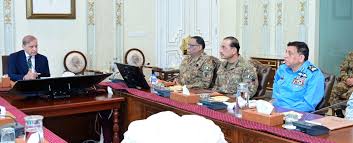
Pakistan on Thursday announced a series of retaliatory measures against India, including the suspension of trade, bilateral agreements, and airspace access. This move comes as a response to New Delhi's aggressive actions following a deadly attack in India-held Kashmir that left 26 tourists dead and 17 injured. Among India’s measures was the unilateral decision to suspend the 1960 Indus Waters Treaty (IWT), a World Bank-brokered agreement that has endured decades of hostility between the two nations. Pakistan strongly condemned this step, calling it "unilateral, unjust, politically motivated, extremely irresponsible, and devoid of legal merit."The decisions were made during a meeting of Pakistan’s National Security Committee (NSC) in Islamabad, chaired by Prime Minister Anwaar-ul-Haq Kakar. The session was attended by top government and military officials, including the defence minister, foreign minister, interior minister, national security adviser, and the chiefs of armed forces.
In its statement, the Prime Minister’s Office (PMO) outlined several retaliatory steps: Suspension of the Simla Agreement Pakistan declared the 1972 Simla Agreement—signed to establish peace after the 1971 war—in abeyance until India ceases its alleged support for terrorism within Pakistan and adheres to international law and UN resolutions on Kashmir.
Closure of Wagah Border
The Wagah Border crossing will be closed effective immediately. All cross-border transit through this route will be suspended, with a deadline of April 30 for individuals who entered with valid endorsements to return via the same route.
Rejection of IWT suspension
Pakistan vehemently rejected India's decision to suspend the Indus Waters Treaty, emphasizing that it is a binding international agreement without provisions for unilateral suspension. The NSC warned that any attempt to stop or divert water belonging to Pakistan would be considered an “Act of War” and responded to with full force across all domains of national power.
Visa restrictions under SAARC scheme
Pakistan suspended all visas issued under the South Asian Association for Regional Cooperation (SAARC) Visa Exemption Scheme (SVES) to Indian nationals, except for Sikh religious pilgrims. Indian citizens currently in Pakistan under SVES must exit within 48 hours.
Expulsion of Indian defence advisers
Pakistan declared Indian defence, naval, and air advisers in Islamabad persona non grata and ordered them to leave the country by April 30. Their posts at the Indian High Commission have been abolished, and support staff associated with these roles must also depart. Additionally, the strength of the Indian High Commission in Islamabad will be reduced to 30 diplomats and staff members.
Airspace closure to Indian airlines
Pakistan announced the immediate closure of its airspace to all India-owned or Indian-operated airlines.
Suspension of trade
All trade with India, including transactions routed through third countries, has been suspended.
Warnings against sovereignty threats
The NSC reiterated that Pakistan remains fully capable and prepared to defend its sovereignty and territorial integrity. It warned that any threat to Pakistan’s security or the rights of its people would be met with firm reciprocal measures across all domains.
Pakistan rejects link to Pahalgam attack
The NSC dismissed Indian claims linking Pakistan to the Pahalgam attack, stating that no credible investigation or verifiable evidence supports such allegations. It accused India of exploiting the incident to further its narrow political agenda and distract from its own human rights violations in occupied Kashmir.
“India’s worn-out narrative of victimhood cannot obfuscate its culpability in fomenting terrorism on Pakistani soil,” the statement read. “Nor can it divert attention from its systematic state-sponsored oppression and human rights abuses in occupied Kashmir.” Pakistan also recalled India’s history of extraterritorial assassinations and vowed to hold accountable those responsible for such acts. Source: Dawn

